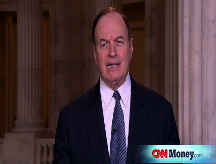Senate stimulus plan: $885 billion
CBO estimates tax cuts would make up bigger chunk of the plan than in the House bill, but still not as much as Republicans want.
NEW YORK (CNNMoney.com) -- The stimulus plan before the Senate would increase the deficit over 10 years by $885 billion, according to a new analysis released on Monday by the Congressional Budget Office.
That's about $64 billion more than the bill passed by the House last week. The cost difference is due in large part to a provision in the Senate bill that would "patch" for one year the Alternative Minimum Tax so that it doesn't start to hit middle- and upper-middle-income families.
The CBO report also touched on one of the more controversial parts of the debate over stimulus: How fast will the money be spent? The CBO estimates that 78% of the Senate's proposed funding (including the lost revenue from tax cuts) would be put to use by the end of fiscal year 2010.
By contrast, the CBO estimated that only 64% of the House bill would be put to use during the same period.
The Senate stimulus proposals dedicated to tax relief and direct payments to individuals - such as an extension and increase in unemployment benefits - would take effect most quickly, the CBO said. The bulk of those funds would be put to use in fiscal years 2009 and 2010. The CBO made a similar assessment of the House bill.
The "spend-out rate" of measures involving the purchase of goods and services made by the federal government or through federal aid to states and localities would be slower.
"Many of those involve construction or investment activity that would take several years to complete," the agency said.
For example, the CBO notes that 85% of $60 billion allocated to highway construction, other transportation projects and community development would be spent in the first five years.
Republicans have expressed concern that some of the measures' spend-out rates will be too slow to be stimulative in the short run. And that's one reason, they say, why they don't want the bill to be weighted so heavily toward spending.
But Democrats note that a staggered release of funds might help the economy.
"While most of the funding will be spent before 2011, many economists believe that the economy still will be weak at that point," according to a statement from Senate Majority Leader Harry Reid, D-Nev. "Those investments that will continue to spend out after 2010 can be helpful in smoothing the course of the recovery, while providing longer-term benefits to the economy."
About 29% of the Senate stimulus proposal's price tag is due to tax cuts. That's up from 22% in the House-passed bill. Senate Republicans have been calling for tax cuts to make up at least 40% of the total bill, since that's what President Obama's original, broadly outlined $775 billion proposal included.
Republicans have also been calling for any stimulus package to have more measures dedicated to spurring the housing market.
"A stimulus bill must fix the main problem first, and that's housing. That's how all of this began. We think you ought to go right at housing first," said Senate Minority Leader Mitch McConnell, R-Ky.
Republicans are not alone in wanting to include greater incentives to encourage home buying. Senate Democrats are expected to be amenable to some new housing measures as the debate takes shape in the Senate this week. ![]()



